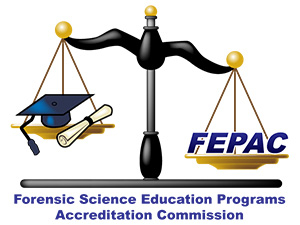
B.S. in Forensic Science
Credit Hours
Practical Experience
Pursue an internship & gain valuable time in the field
Transfer Credits
Transfer up to 75% of degree total to Liberty
Apply to Medical School
Acceptance rate over 80% for department graduates
Accreditation
Forensic Science Education Programs Accreditation Commission (FEPAC)
Credit Hours
Practical Experience
Pursue an internship & gain valuable time in the field
Transfer Credits
Transfer up to 75% of degree total to Liberty
Apply to Medical School
Acceptance rate over 80% for department graduates
Accreditation
Forensic Science Education Programs Accreditation Commission (FEPAC)
- Home
- School of Health Sciences
- Bachelor’s Degrees
B.S. in Forensic Science
Additional Navigation
Residential Forensic Science Program
The Bachelor of Science in Forensic Science degree provides students with interdisciplinary training in chemistry, biology, and criminal justice. Graduates have the opportunity to begin careers with the Virginia Department of Forensic Science, the medical examiner’s office, local police departments, the Department of Health, the FBI, the Department of Homeland Security, local and regional offices of the Chief Medical Examiner, the National Institute of Health, the Naval Criminal Investigative Service (NCIS), and many more.
The Forensic Science program has developed relationships with local, regional, and national forensic science laboratories. These laboratories include the Toxicology Section of the Office of the Chief Medical Examiner (OCME) in the District of Columbia, the Virginia Department of Forensic Science in Roanoke, VA, NMS Laboratories in Willow Grove, PA, the Bode Technology Group in Lorton, VA, Parabon Nanolabs, Inc. in Reston, VA.
The B.S. in Forensic Science is offered through the Department of Biology & Chemistry.

The Forensic Science program is accredited by the Forensic Science Education Programs Accreditation Commission (FEPAC).
FEPAC is dedicated to maintaining and enhancing the quality of forensic science education programs. The commission is part of the American Academy of Forensic Sciences.
Liberty University is regionally accredited by SACSCOC.
Academics: Forensic Science (B.S.)
Degree Completion Plan (DCP)
Admission Requirements
View Liberty’s undergraduate admissions requirements
Featured Courses
- Forensic Chemistry (CHEM 357)
- Intro to Forensics (CJUS 360)
- Forensic DNA Analysis (BIOL 361)
- Forensic Entomology (BIOL 421)
- Trace Evidence (BIOL 465)
- Criminal Investigations I & II (CJUS 420, 421)
Student Placement & Success Outlook
Internships & Independent Studies
Below are the number of students placed in Internships and Independent Studies.
Academic Year
2020-2021
2019-2020
2018-2019
2017-2018
2016-2017
2015-2016
Internships
0*
6
6
3
3
0
Independent Studies
3
2
1
2
0
0
*Several students were awarded internships with State and Federal agencies, however, these internships were canceled due to the COVID-19 pandemic.
Student Success
The Forensic Science Program was started in the Fall of 2015 offering specialty areas in forensic biology or forensic chemistry. The Forensic Science Program has graduated five (5) classes; May 2016, May 2017, May 2018, May 2019, and May 2020. Undergraduates majoring in forensic science graduate with a Bachelor of Science in Forensic Science. To monitor student success, surveys were taken 6 – 12 months after graduation, as well as, personal communications with graduates to determine employment status or placement into graduate school or professional school.
Questions
Working in the Forensic Science Field
Working in a non-Forensic Science Laboratory
Placement into Graduate or Professional School
Unemployed
Currently in an Internship
Total Responses
2015-2023 Graduates
35%
24%
37%
Data Unavailable
0%
37 out of 69
Student Success Story: Kate Ferro ’24

Following graduation from Liberty University in 2024, Kate Ferro is continuing her education by pursuing a Masters in Forensic Science with a concentration in Toxicology and Drug Chemistry at Virginia Commonwealth University in Richmond, Virginia.
Ms. Ferro’s undergraduate research included “Identification and Compositional Analysis of Various Animal Hairs Using SEM Microscopy” done at Liberty University and “Validation of Phencyclidine, Ketamine, and Dextromethorphan using Miscellaneous Basic Drugs Quantitation and Confirmation by Liquid-Liquid Extraction using Liquid Chromatography-Mass Spectrometry” which was performed at the Department of Forensic Science Western Laboratory.
Student Success Story: Emily Green ’23

After completing her undergraduate Forensic Science degree with honors in May 2023, Ms. Emily Green accepted a position at the North Carolina State Crime Laboratory. Her position in the drug chemistry unit helps to investigate non-biological trace evidence found at crime scenes and to analyze materials related to controlled substances.
During her time at Liberty University, Ms. Green was a part of several academic clubs, led the university’s Forensic Science club, and worked as a teaching assistant for both microbiology and DNA analysis laboratories. Ms. Green plans to continue her education in the future with graduate school.
Student Success Story: Jessica Thornton ’21

Upon completion of her undergraduate degree in Forensic Science in May 2021, Ms. Jessica Thornton is continuing her education by pursuing a Doctorate of Philosophy in Forensic Science at West Virginia University in Morgantown, West Virginia.
While attending graduate school as a full-time student, Ms. Thornton works as a Graduate Teaching Assistant, teaching undergraduate biology labs. In addition, her graduate research is concentrated in forensic genetics, specifically regarding the isolation and subsequent use of indels for the purposes of DNA identification of degraded samples.
Ms. Thornton’s undergraduate research on “Changes in the Microbiome at the Onset and End of Decomposition” was recently published in the Journal of Biotechnology and Bioinformatics Research.
Student Success Story: Brittany Johnson ’21

In the spring of 2021, Ms. Johnson completed her undergraduate degrees in
Forensic Science and Criminal Justice: Crime Scene Investigations.
Ms. Johnson continued her education by pursuing a Masters of Science degree in
Biomedical Sciences at Liberty University. Ms. Johnson was involved in numerous
academic clubs, including the Forensic Science Club, and research during her time
as an undergraduate student. Throughout her time as a graduate student, Ms. Johnson plans on continuing research under the supervision of Dr. J. Thomas McClintock as well as providing assistance in various Forensic Science courses.
Student Success Story: Michael Erquiaga ’20

Following graduation from Liberty University in 2020, Michael Erquiaga secured a job with Bode Technology, a nationally recognized forensic lab in Lorton, Virginia. He currently holds the position of Laboratory Assistant and is responsible for servicing vital lab equipment.
Most recently, Michael has been added to the extract return team where he ensures the safe return of DNA samples to police departments across the nation. In the future, he looks to be hired to Bode’s Applied Science research team. Mr. Erquiaga’s undergraduate research on the “Changes in the Microbiome at the Onset and End of Decomposition” was recently published in the Journal of Biotechnology and Bioinformatics Research.
Student Success Story: Mia Fabbri ’20

After obtaining her undergraduate degree in Forensic Science in May 2020, Ms. Mia Fabbri continued to pursue a Master’s of Science degree in Forensic Science from Cedar Crest College in Allentown, PA.
While attending Liberty, Ms. Fabbri worked as a Graduate Assistant performing weekly quality control/quality assurance procedures on various instruments including NMR, UV-Vis, and Fluorescent Spectrophotometers. This work ensures that the instruments are accurate and reliable for research and study purposes.
Ms. Fabbri’s undergraduate research on the “Changes in the Microbiome at the Onset and End of Decomposition” was recently published in the Journal of Biotechnology and Bioinformatics Research.
Internships
Through Liberty’s Washington Fellowship, you can apply for a semester-long internship with the FBI, NCIS, the District of Columbia OCME, and other agencies. This internship will allow you to receive academic internship credit while learning valuable life skills that can be used in the professional forensic science field or to pursue graduate studies.
Related Article
A Closer Look: DNA expert opens doors for students to participate in groundbreaking projects
Mission
The mission of Liberty University’s Bachelor of Science in Forensic Science program is to provide students with a solid foundation in the forensic sciences, as well as prepare each student to have effective and productive careers in private, state, and federal forensic laboratories, research laboratories, and clinical laboratories.
LU Forensic Science Lab from Liberty News on Vimeo.
Read about our FEPAC accreditation in Forensic science program joins exclusive list for national FEPAC accreditation from Liberty News.
Career Opportunities
- Criminal Investigator
- Criminalist – Serology
- Evidence Technician
- Forensic Chemist/Toxicologist
- Forensic Consultant
- Forensic DNA Analyst
- Forensic Autopsy Technician
- Forensic Entomologist
- Forensic Examiner – Trace Evidence
- Forensic Quality Assurance Specialist
- Forensic Scientist
- Forensic Microbiologist
- Trace Evidence Technician